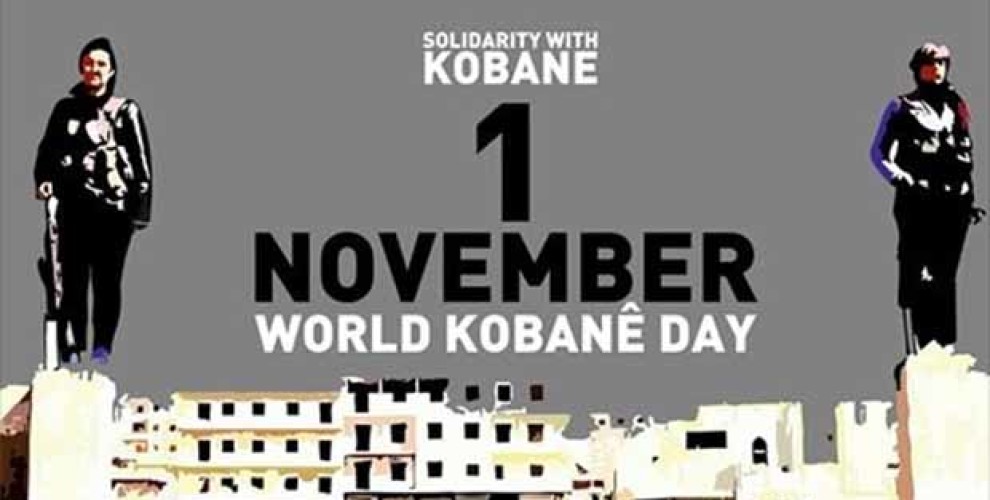Kobanê: Alive and kicking
On Kobanê World Day, a quick look at how concrete and punctual solidarity is making a difference in the city and people's life.
On Kobanê World Day, a quick look at how concrete and punctual solidarity is making a difference in the city and people's life.

Today is Kobanê World Day. A way to understand how Kobanê has been returning to life after its liberation by the YPG and YPJ, in January 2015, is by looking up the number of projects developed and implemented in the city and its villages by the Municipality and Canton Autonomous Administration.
Most work is carried out by the Autonomous Administration itself, but there are important projects implemented thanks to the concrete and direct solidarity of institutions and organisations from different countries.
In the autumn of 2014 the Canton of Kobanê came under attack from the terrorist organization of the Islamic State, DAESH, which managed to take over the entire canton, with the exception of parts of Kobanê city.
The entire population of Kobanê was forced to evacuate. Although the Peoples' Defense Forces (YPG) and Women's Defense Forces (YPJ) managed to liberate the canton in the spring of 2015 with the support of the Allied Forces, most of the infrastructure of the canton was destroyed.
DAESH had booby trapped, looted, or destroyed important infrastructural works on their retreat, such as grain silos, water stations, bridges, roads, schools, and hospitals.
Up to eighty percent of the city of Kobanê lay in ruins, as did many of the surrounding canton villages.
The liberated city returned to life
Since its liberation, more than 350.000 people have returned to Kobanê’s cities and villages, despite the serious limitations.
Besides its own population, the canton, while struggling to rebuild itself, has taken in large numbers of IDP's from other regions of Syria, most notably from nearby cities Manbij and Raqqa, and most recently from Afrin.
The consistent return of the population is closely linked to the capacity and visibility of the reconstruction process by the Kobanê Reconstruction Committee, in collaboration with the Canton and the Municipality, which has generated a high degree of trust within the community.
The canton contains approximately 450 villages and had a population of 400.000 before the outbreak of the Syrian Civil War.
The Canton of Kobanê is part of the Democratic Federation of North Syria, and is currently the safest and most stable – both in terms of politics and military action - area in Syria.
Water is one of the main problems
One of the main problems the Canton is experiencing is the lack or difficulty to access water.
The project Av, Jiyan, Azadi - Acqua Vita Libertà has been a success for the municipality of Kobanê.
Thanks to the support of Arci Comitato Territoriale di Firenze, the Water Board of the Municipality of Kobanê was able to refit two important village wells with new, modern pumps, and increase the availability of water in the city of Kobanê by installing a new water pump at the Shyokh (Shegler) pump station.
This project shows how concrete solidarity on a specific issue can actually make a huge difference in the life of people.
A total of 1.825 households have (re)gained access to water through the water grid served by the three repaired pump stations as a result of this project.
With a local average of 6 persons per household, this means approximately 10.950 people now have access to water in their own homes.
The project, Av, Jiyan, Azadi - Acqua Vita Libertà, was created with an aim to "improve the socio-economic conditions of the population of the North of Syria" through a series of activities that aim to "contribute to the water supply of three villages in the Canton of Kobanê and to the efficient irrigation systems of the Canton of Kobanê."
Concrete projects: Water, Life, Freedom
In its first phase, these outcomes were to be achieved through the repair of two water pumps in the villages of Sheran and Alisar, and the instalment of two water pumps in Shegler (known as Shyokh in Arabic).
The increased access to water for new households, as well as the increased reliability and increased hours of availability of water for the households that were already connected to the three water networks will significantly increase peoples' wellbeing not only in terms of health and hygiene, but also in terms of increased livelihood opportunities, such as subsistence farming.
People will be able to spend less time and money on bringing water to their homes from other places, and the increasing availability of water in the long-term will allow more and more people to return to their homes in both cities and the countryside of Kobanê, from refugee camps in and outside of Syria.
In terms of the continuation of the repair of the water infrastructure of the Kobanê Canton, every municipality of the canton is responsible for the upkeep of their pumps and pipelines. With a water tax of $ 1,00 (500 Syrian Pounds) per month per household, basic repairs and upkeep are covered.